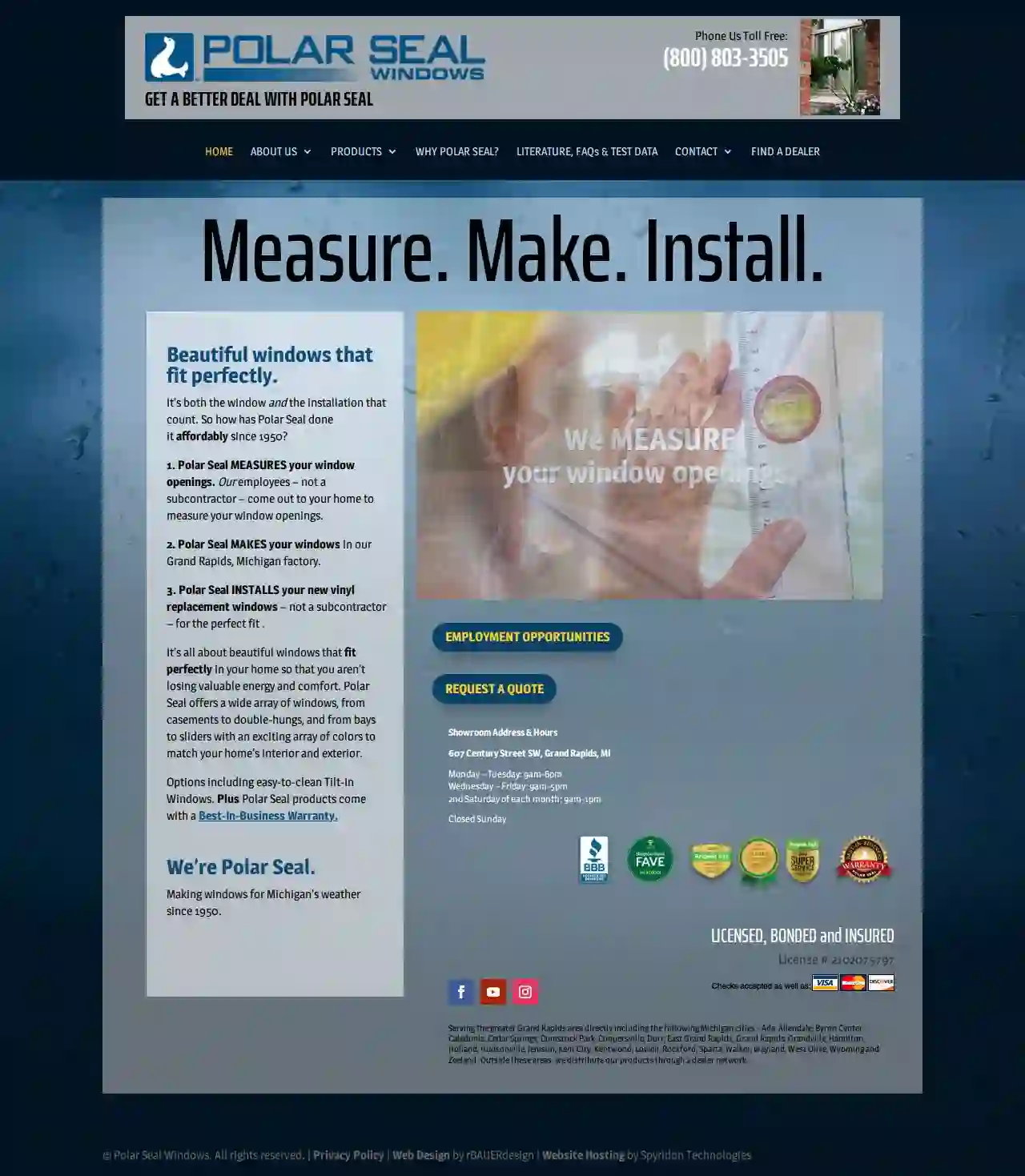Window Cleaning Southfield
Best Window Cleaning in Southfield
Receive 3 FREE Window Cleaning quotes for your project today! Compare profiles, reviews, accreditations, portfolio, etc... and choose the best service.

Polar Seal Windows
4.880 reviews607 Century Street SW, Grand Rapids, 49507, USSince 1950, Polar Seal has been crafting windows designed to withstand Michigan's unique weather conditions. We're a family-owned and operated business dedicated to providing high-quality, affordable windows that enhance the beauty and comfort of your home. Our commitment to excellence extends beyond just manufacturing; we also measure, make, and install your windows, ensuring a perfect fit every time. What sets Polar Seal apart? It's our dedication to a seamless process, from initial measurement to final installation. Our experienced employees, not subcontractors, handle every step, guaranteeing precision and attention to detail. We offer a wide range of window styles, including double-hungs, sliders, casements, awnings, bays, bows, and picture windows, all available in a variety of colors to complement your home's aesthetic. Our Tilt-In Windows feature easy-cleaning functionality, making maintenance a breeze. Plus, every Polar Seal product comes backed by our Best-In-Business Warranty, providing you with peace of mind for years to come. Whether you're looking to replace old, drafty windows or enhance the curb appeal of your home, Polar Seal is your trusted partner. Contact us today for a free quote and experience the Polar Seal difference.
- Services
- Why Us?
- Accreditations
- Our Team
- Testimonials
- Gallery
Get Quote
Great Lakes Window Cleaning
4.634 reviews501 W. Mt. Hope Ave, N/A, Lansing, 48910, USGreat Lakes Window Cleaning is Michigan's premier local window cleaning company, serving Lansing and the surrounding areas since 1980. We are dedicated to providing exceptional window cleaning services for both residential and commercial clients, transforming your view into a masterpiece. Our commitment to excellence extends beyond streak-free windows; we prioritize professionalism, innovation, and safety in every aspect of our work. We take pride in our experienced and long-term employees, who undergo a rigorous training and mentoring program to ensure they deliver the highest quality service. We are fully insured and bonded, providing you with peace of mind and protection. Our triple guarantee ensures a seamless experience: streak-free windows, satisfaction guaranteed, and a 48-hour no raindrops guarantee. Choose Great Lakes Window Cleaning for a transformative experience where meticulous attention to detail meets exceptional care.
- Services
- Why Us?
- Accreditations
- Our Team
- Testimonials
- Gallery
Get Quote
616 Window Cleaning, LLC
518 reviews5965 Polk St, Hudsonville, 49426, USYour home is the biggest asset you own. Get free quote Get in touch 616 Window Cleaning is locally owned and operated. We will care for your home as we would our own. We are a professional window cleaning company. We are registered with the state of Michigan. Our employees are insured, including workers compensation. At 616 Window Cleaning we understand the importance the role proper care and maintenance plays on the value and curb appeal of your home. Our technicians are fully trained in safety, as well as in all cleaning processes of the services we carry. Our work is backed by our satisfaction guarantee. *Ask for Details* Our crew will always arrive at the scheduled time, in uniform and driving a 616 Window Cleaning truck. Call us today: 616-634-3049 We do it all at 616 Window Cleaning! See Why Our Customers Love Us! Michael did a terrific job on our windows! Want your windows to be beautifully cleaned - call 616 Window Cleaning. They were GREAT! Holly R. Michael did a wonderful job! Highly recommend 616 Window Cleaning Kim R. Just want to thank 616 Window Cleaning for the fabulous job on my house! We live out on the Eastmanville Bayou and the bugs are bad. Also, my front entryway draws birds. It looks so clean and refreshed Renee V. Our home is white and 20 years old. When they were finished cleaning our eaves and other areas, looked like new!! Nice and easy to work with! Jill W. Professionalism, Punctuality, Quality, Responsiveness Kristalyn B. Thank you! Y'all did a great job! Shannon K Previous Next Serving the Greater Grand Rapids Area and Lakeshore Ada Allendale Belding Byron Center Caledonia Cascade Cedar Springs Coopersville Grand Haven Grandville Greenville Holland Hudsonville Ionia Lowell Rockford Saugatuck Spring Lake Walker Zeeland
- Services
- Why Us?
- Our Team
- Testimonials
- Gallery
Get Quote
Shine of Lansing
4.9273 reviews123 Main Street, Suite 100, Lansing, 48911, USEating great food, experiencing the arts, visiting the capitol, or chanting “Go Green”, is what makes the city of Lansing a great place to live in and explore. Home to Michigan’s historic State Capitol Building, our city draws in a significant amount of visitors from across the country, bringing life and vibrancy to downtown. Shine of Lansing is glad to add to this vibrancy by making Michigan’s Capital City shine brightly with specialized exterior cleaning services and professional window cleaning. Let’s face it, keeping your windows sparkling in Lansing is a full-time job. However, at Shine, we’re glad to do it for you! As it helps us fulfill our vision to create a brighter world. Shine of Lansing provides window cleaning services to commercial buildings & residential homes in L-town and nearby areas with a 100% satisfaction guarantee. Our team is more than just window cleaners, we’re also a crew of gutter-cleaning specialists, pressure-washing pros, and Christmas lighting experts. Whatever weather the Michigan seasons throw your way, our team is ready to make your home shine again! Schedule a free estimate by contacting us today!
- Services
- Why Us?
- Accreditations
- Our Team
- Testimonials
- Gallery
Get Quote
Shine of Grand Rapids
5261 reviews1000 28th St SE, Grand Rapids, MI 49506, 49506, USShine of Grand Rapids is a locally owned and operated window cleaning company serving the greater Grand Rapids area, including Byron Center, Rockford, Cedar Springs, and more. Founded in 2012 by Aaron Haarsma, Shine of Grand Rapids has been providing exceptional service to over 18 communities for the past decade. We specialize in professional window cleaning, pressure washing, holiday lighting, gutter cleaning, and roof washing services for both residential and commercial properties. Our mission is to keep our customers happy by delivering high-quality services with a 100% satisfaction guarantee. We are proud to be an award-winning company dedicated to bringing the beauty of Grand Rapids to life, one sparkling window at a time.
- Services
- Why Us?
- Accreditations
- Our Team
- Testimonials
- Gallery
Get Quote
FreshSpace Cleaning Detroit
4.869 reviewsDetroit, USFreshSpace Cleaning Service is a top-rated home cleaning company in Detroit with a proven track record of quality and reliability from many satisfied customers. Detroit, also known as the Motor City due to its legacy as the birthplace of the American automotive industry, is one of the biggest and trendiest cities in midwestern Michigan. A beautiful city of contrasts, it’s got everything you need and more, from stunning architecture, unique public art installations, sprawling green spaces, historic neighborhoods, and breathtaking views of the city skyline along the Detroit Riverfront.Living in Detroit sounds exciting. So wouldn’t it be a shame to be spending your free time worrying about your endless list of house cleaning chores. FreshSpace Cleaning Service is here to help! We offer a variety of cleaning services to fit your needs, including standard cleaning, deep cleaning, move-in/move-out cleaning, one-time cleaning, regular home cleaning, post-construction clean, and eco-friendly home cleaning. We also offer after-party clean up services. Our team of highly experienced and vetted cleaning professionals is dedicated to providing you with the highest quality of service. We use only the best cleaning products and equipment, and we are fully insured. We are committed to providing our customers with a 100% satisfaction guarantee. If you are not happy with our service, we will make it right. Call us today or book online to schedule your cleaning!
- Services
- Why Us?
- Gallery
Get Quote
A1A Window Cleaning
4.737 reviews4671 Teton Ct SW, Grandville, 49418, USWE'LL TAKE CARE OF THE DIRTY WORK. Over 20 years of taking on the dirtiest, toughest jobs in West Michigan. See Our Services #1 Rated Grand Rapids Residential Window Cleaning & Much More Interior/ExteriorWindow Cleaning Pure WaterWindow Cleaning Window ScreenCleaning GutterCleaning Pressure Washing /Soft Wash Professional Roof Washing Paver Cleaning& Restoration Light FixtureCleaning Christmas Light Hanging YOU'LL LOVE THE RESULTS. Siding, brick, stone, roofs and out-buildings all build up mildew and dirt over time. Renew your home with the best pressure cleaning company in Grand Rapids. Stop the slow build-up of value diminishing molds and refresh your home or business today. More About A1A BEFORE & AFTER We're here to clean. Your home deserves a custom plan and a fresh new look. REQUEST AN ESTIMATE → NO JOB IS TOO TOUGH- CALL US NOW!
- Services
- Why Us?
- Gallery
Get Quote
Fish Window Cleaning
516 reviews16949 12 Mile Road., Roseville, 48066, USOwner: Paul & Debbie Megge Serving: Sterling Heights, Warren, Grosse Pointe, Fraser, Clinton Township, Saint Clair Shores, Roseville, Detroit, Grosse Pointe Shores, Grosse Pointe Farms, Grosse Pointe Park, Grosse Pointe Woods, Eastpointe, and Harper Woods, MI. We're located at: 16949 12 Mile Road., Roseville MI 48066 (586) 218-6464 Welcome to Fish Window Cleaning Sterling Heights, Warren, Grosse Pointe, Fraser, Clinton Township, Saint Clair Shores, Roseville, Detroit, Grosse Pointe Shores, Grosse Pointe Farms, Grosse Pointe Park, Grosse Pointe Woods, Eastpointe, and Harper Woods, MI. We are your local window cleaning professionals and we'll make your home or business sparkle. Call us today for a free on-site estimate! (586) 218-6464 Whether you're looking for services for your home or your business, you deserve a reliable window cleaning company with a team you can trust to get the job done right. With Fish Window Cleaning, that's exactly what you'll get. Our services include: Residential Window Cleaning Commercial Window Cleaning Storm Window Cleaning Screen Cleaning Sill Cleaning Skylight Cleaning Mirror Cleaning Chandelier Cleaning Gutter Cleaning Construction Clean-Up A member of our professional, uniformed staff will be happy to recommend a program that works within your needs, budget, and schedule. Call (586) 218-6464 or click on the green Free Estimate button above to request an estimate today! Check out Paul Megge, owner of Fish Window Cleaning Fraser, MI, discussing ladder safety tips on Fox 2 Detroit below! Your Home We know that your home and everything in it is important to you. That's why we take the utmost care while making your windows sparkle. We wear clean shoe covers while inside your home and even use absorbent cloths pads underneath your windows as we clean. Our team is trustworthy, uniformed, and friendly. We are also bonded and insured so when you hire FISH, you don't have to worry about a thing. All you need to do is sit back and enjoy your new, clear view. Click here for more information about our residential window cleaning services. Your Business We understand that the needs of businesses vary. We clean all types of windows in restaurants, showrooms, sales floors, churches, office buildings, and more. We'll customize our services to meet your needs, budget, and schedule. We also provide the added peace of mind that bonded and insured window cleaners will be maintaining the appearance of your business all year long. Click here for more information about our commercial window cleaning services. Cleaning Comerica Park for the Detroit Tiger's Opening Day! Serving the following zip codes in Sterling Heights, Grosse Pointe, Fraser, Clinton Township, Saint Clair Shores, Roseville, Det
- Services
- Why Us?
- Our Team
- Gallery
Get Quote
Dover Doors & Windows (Lansing)
512 reviews2535 S. Grand Traverse St., Flint, 48503, USIncrease Your Home’s Value and Curb Appeal Your hometown choice for garage doors, entry doors, patio doors, windows, siding, gutters & more. SINCE 1936! Increase Your Home’s Value and Curb Appeal Your hometown choice for garage doors, entry doors, patio doors, windows, siding, gutters & more. SINCE 1936! PRODUCTS AND SERVICES FOR YOUR HOME GARAGE DOORS ENTRY DOORS PATIO DOORS WINDOWS SEAMLESS GUTTERS VINYL SIDING Openers & Accessories SCHEDULE SERVICE DOVER COMMERCIAL PRODUCTS AND SERVICES Commercial Sectional Doors Rolling Steel Doors Loading Docks Dock Levelers Commercial Openers Hollow Metal Doors Bathroom Partitions Commercial Service HERE IS WHAT OUR CUSTOMERS ARE SAYING ABOUT DOVER We had our wood window frames and corners sided with aluminum. We couldn’t be happier with the updates. It definitely gave our home the refresh...Read More » 3 months ago C Priester My family utilized the services of Dover and was highly satisfied with the entire experience. Our technician, Cody Lewis, was exemplary. He was professional and...Read More » a week ago Natalie Sevick Ordered two exterior doors from Dover. Cody arrived at my house to install and did a superb job. All trim was installed perfectly,...Read More » a month ago Mark Lyman Joe & Wyatt did a really fantastic job installing our new garage doors! Their work ethic was of quality & excellence. They made sure the...Read More » 3 weeks ago Dawn Tomaszewski
- Services
- Why Us?
- Testimonials
- Gallery
Get Quote
Platinum Property Solutions
Suite B-01, 1701 Clyde Park Ave SW, Wyoming, 49509, USPlatinum Property Solutions is a veteran-owned company that provides superior house washing services, including pressure washing and softwashing, throughout West Michigan. Our cleaning professionals use the latest in equipment and methods to properly clean a variety of exterior surfaces of your home or commercial building including roofs, windows and siding. We pride ourselves on delivering the best customer service and exterior cleaning services in the area. Your satisfaction is important to us, and we encourage our customers to tell us how we did and refer us to their family and friends!
- Services
- Why Us?
- Our Team
- Testimonials
- Gallery
Get Quote
Over 60,241+ Cleaning Services onboarded
Our cleaning services operate in Southfield and surrounding areas!
CleaningMatch has curated and vetted Top Cleaning Businesses in and around Southfield. Find a top & trustworthy contractor today.
Frequently Asked Questions About Window Cleaning
- Visible Dirt and Grime: Obvious dirt, streaks, or fingerprints on your windows detract from their appearance and hinder natural light.
- Hard Water Stains: Stubborn hard water stains, often appearing as white or cloudy spots, can be difficult to remove with DIY methods.
- Difficulty Seeing Clearly: If dirt or grime obstructs your view, it's a sign that your windows need a thorough cleaning.
- Allergies: Dirty windows can harbor dust and allergens, triggering allergies or respiratory problems for sensitive individuals.
- Last Cleaning Was Over Six Months Ago: If it's been more than six months since your last professional cleaning, it's generally a good idea to schedule another one.
- Squeegees: A T-shaped tool with a rubber blade, used to remove cleaning solution from the glass, leaving a streak-free finish.
- Microfiber Cloths: Soft, lint-free cloths that are highly effective at cleaning glass without scratching.
- Buckets: Used to hold cleaning solutions and rinse water.
- Spray Bottles: Used to apply cleaning solutions to windows.
- Scrapers: Used to remove stubborn dirt, paint splatters, or stickers from windows.
- Extension Poles: Extend the reach of squeegees and brushes, allowing cleaners to reach high windows without ladders.
- Water-Fed Pole Systems: Use purified water and a telescopic pole with a brush head to clean windows from the ground.
- Training and Certification: Professional high-rise window cleaners undergo specialized training and certification programs to learn safe working practices and rescue procedures.
- Safety Equipment: They use harnesses, ropes, and other safety equipment to secure themselves to the building while cleaning.
- Risk Assessments: Before starting a job, companies conduct thorough risk assessments to identify potential hazards and implement appropriate safety measures.
- Weather Monitoring: High-rise window cleaning is typically avoided during strong winds or adverse weather conditions to minimize risks.
- Experience: 'How long have you been in the window cleaning business?'
- Licensing and Insurance: 'Are you licensed, insured, and bonded?'
- Cleaning Methods: 'What cleaning methods and solutions do you use? Do you use traditional methods or a water-fed pole system?'
- Safety Procedures: 'What safety precautions do you take, especially for high-rise window cleaning?'
- Guarantees: 'Do you offer a satisfaction guarantee?'
- References: 'Can you provide references from previous clients?'
What are some signs that my windows need professional cleaning?
Professional window cleaning can restore the clarity and shine of your windows, improve your view, create a healthier indoor environment, and enhance the overall appearance of your home or business.
What are some common window cleaning tools?
These specialized tools, combined with professional techniques, ensure efficient and effective window cleaning results.
Is it safe for window cleaners to clean high-rise windows?
Reputable window cleaning companies adhere to strict safety regulations and invest in training and equipment to ensure the well-being of their employees and the public.
What should I ask a window cleaner before hiring them?
By asking these questions, you can assess their professionalism, experience, and commitment to safety and customer satisfaction.
What are some signs that my windows need professional cleaning?
- Visible Dirt and Grime: Obvious dirt, streaks, or fingerprints on your windows detract from their appearance and hinder natural light.
- Hard Water Stains: Stubborn hard water stains, often appearing as white or cloudy spots, can be difficult to remove with DIY methods.
- Difficulty Seeing Clearly: If dirt or grime obstructs your view, it's a sign that your windows need a thorough cleaning.
- Allergies: Dirty windows can harbor dust and allergens, triggering allergies or respiratory problems for sensitive individuals.
- Last Cleaning Was Over Six Months Ago: If it's been more than six months since your last professional cleaning, it's generally a good idea to schedule another one.
Professional window cleaning can restore the clarity and shine of your windows, improve your view, create a healthier indoor environment, and enhance the overall appearance of your home or business.
What are some common window cleaning tools?
- Squeegees: A T-shaped tool with a rubber blade, used to remove cleaning solution from the glass, leaving a streak-free finish.
- Microfiber Cloths: Soft, lint-free cloths that are highly effective at cleaning glass without scratching.
- Buckets: Used to hold cleaning solutions and rinse water.
- Spray Bottles: Used to apply cleaning solutions to windows.
- Scrapers: Used to remove stubborn dirt, paint splatters, or stickers from windows.
- Extension Poles: Extend the reach of squeegees and brushes, allowing cleaners to reach high windows without ladders.
- Water-Fed Pole Systems: Use purified water and a telescopic pole with a brush head to clean windows from the ground.
These specialized tools, combined with professional techniques, ensure efficient and effective window cleaning results.
Is it safe for window cleaners to clean high-rise windows?
- Training and Certification: Professional high-rise window cleaners undergo specialized training and certification programs to learn safe working practices and rescue procedures.
- Safety Equipment: They use harnesses, ropes, and other safety equipment to secure themselves to the building while cleaning.
- Risk Assessments: Before starting a job, companies conduct thorough risk assessments to identify potential hazards and implement appropriate safety measures.
- Weather Monitoring: High-rise window cleaning is typically avoided during strong winds or adverse weather conditions to minimize risks.
Reputable window cleaning companies adhere to strict safety regulations and invest in training and equipment to ensure the well-being of their employees and the public.
What should I ask a window cleaner before hiring them?
- Experience: 'How long have you been in the window cleaning business?'
- Licensing and Insurance: 'Are you licensed, insured, and bonded?'
- Cleaning Methods: 'What cleaning methods and solutions do you use? Do you use traditional methods or a water-fed pole system?'
- Safety Procedures: 'What safety precautions do you take, especially for high-rise window cleaning?'
- Guarantees: 'Do you offer a satisfaction guarantee?'
- References: 'Can you provide references from previous clients?'
By asking these questions, you can assess their professionalism, experience, and commitment to safety and customer satisfaction.